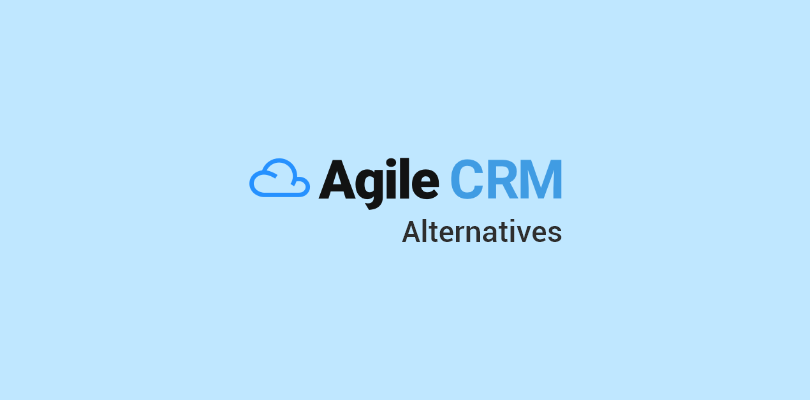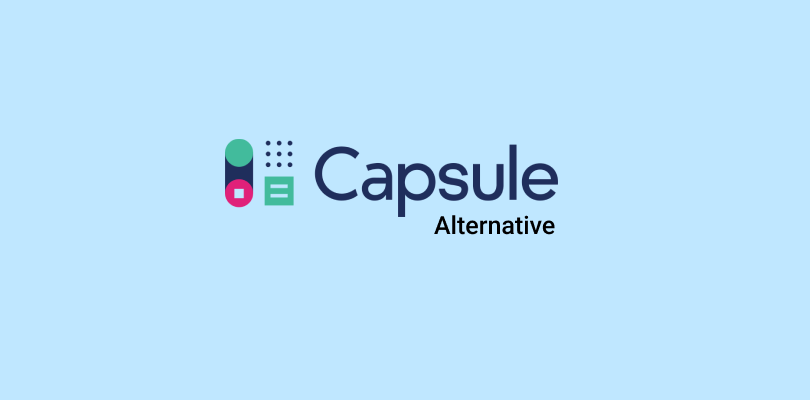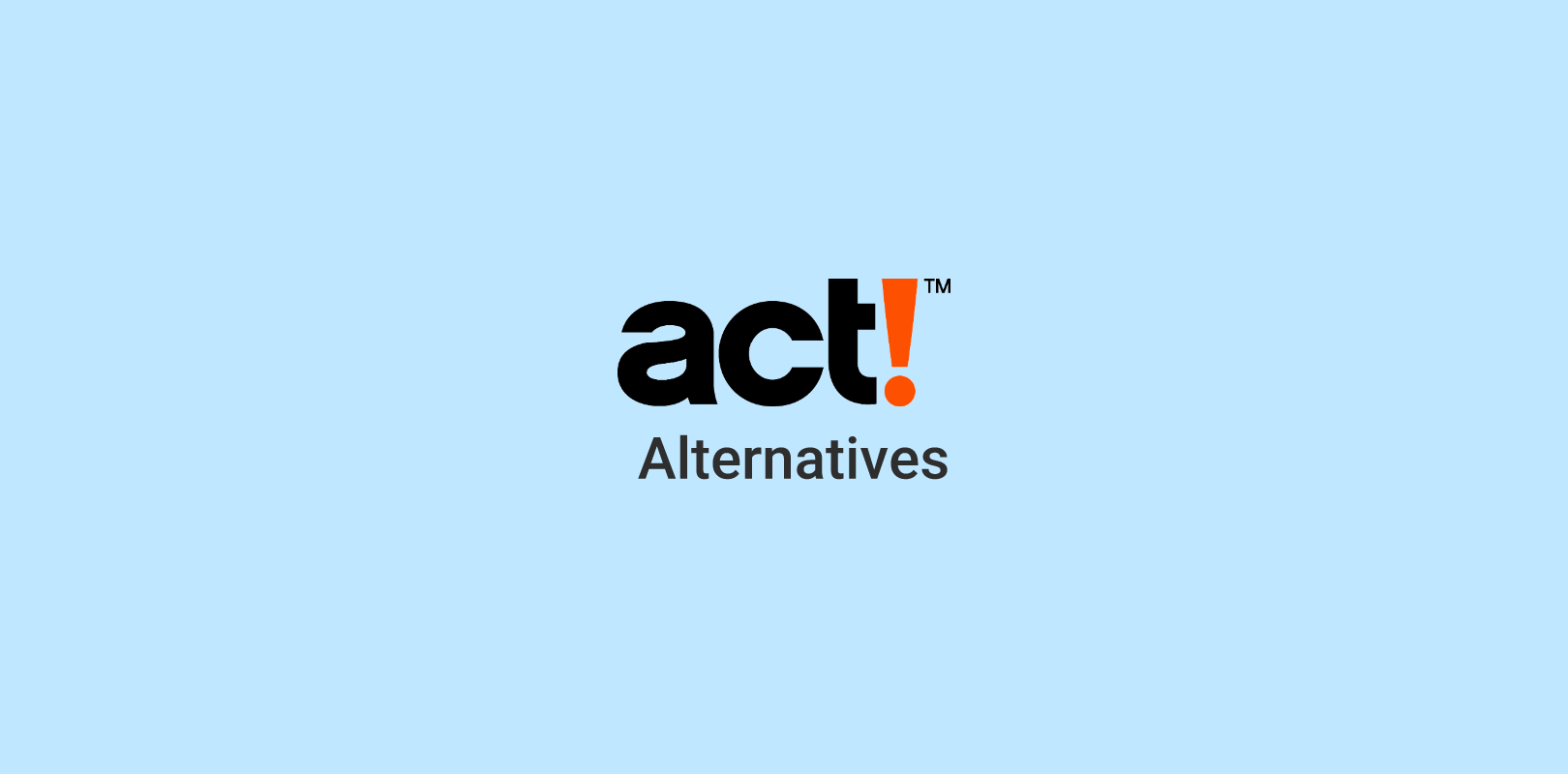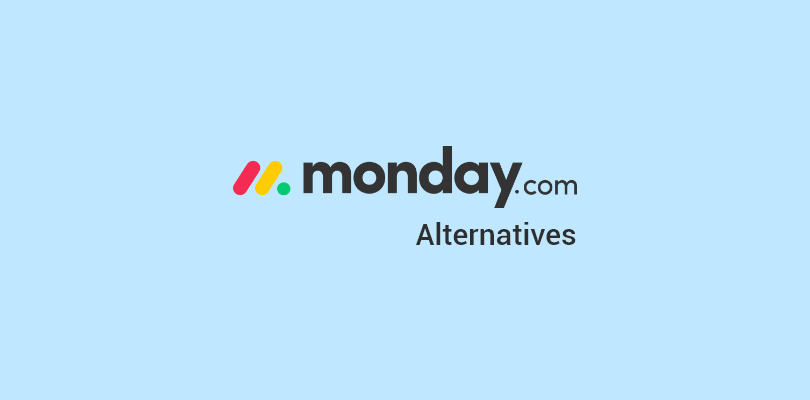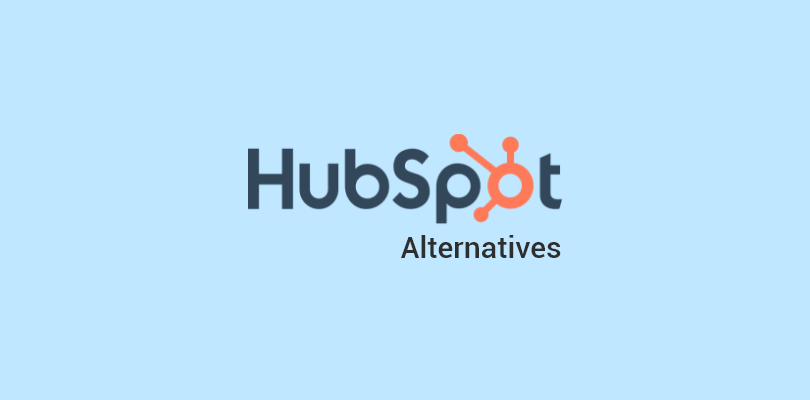Navigating the clunky interfaces and limited functionalities of a CRM application can severely drain your resources and, ultimately, your ROI.
| CRM | Best For | Plan |
|---|---|---|
| BIGContacts | Contact Management & Email Marketing | Forever free plan for startups with all premium features. Paid plan starts at $9.99/month. |
| HubSpot | Email Tracking & Templates | A free plan is available. Paid plans start at $18/month. |
| Monday Sales CRM | Lead Management | Starts at $36/3 seats/month. |
| Keap | Lead Scoring | Starts at $159/month. |
| Thryv | Centralized Inbox | A free plan is available. Paid plans start at $20/seat/month. |
| FollowUp CRM | Workload Management & Scheduling | Custom pricing. |
| Agile CRM | Email Marketing | A free plan is available. Paid plans start at $14.99/month. |
Top 7 Less Annoying CRM Alternatives for 2025
This list of the best Less Annoying CRM software is backed by my personal experience with these tools. Additionally, I’ve incorporated recommendations from experts in the field and trusted review sites.
1. BIGContacts – Best for Contact Management & Email Marketing
BIGContacts is a simple and affordable CRM software that helps me manage my contacts, leads, and email marketing campaigns.
One of the features that I like the most is contact management. I can sort and view my contacts by criteria, such as activity, opportunity, last contact, or last communication. I can also track all the files related to each contact and see their social media profiles.
This gives me a 360° view of my customers and prospects and helps me stay on top of the follow-ups.
Another feature that I find very useful is the email marketing. I can create custom sales pipelines and send automated emails based on the sales cycle stage. The email templates are easy to customize, and the reports are insightful.
BIGContacts is an excellent alternative to Less Annoying CRM, offering more features and integrations at a similar price.
What You’ll Like:
- Deal tracking to automate deal management and prioritize high-value deals
- Sales pipeline management with multiple stages, automated tasks, and reminders
- Reports and analytics with dashboards, charts, and graphs to track sales performance
- Team Calendar with drag-and-drop task lists to get a complete view of all your activities
What You May Not Like:
- Regular updates can be overwhelming for new users
- Constant internet connectivity is required for optimal performance
Pricing:
- Forever free plan for startups with all premium features. Paid plan starts at $9.99/month.
2. HubSpot – Best for Email Tracking & Templates
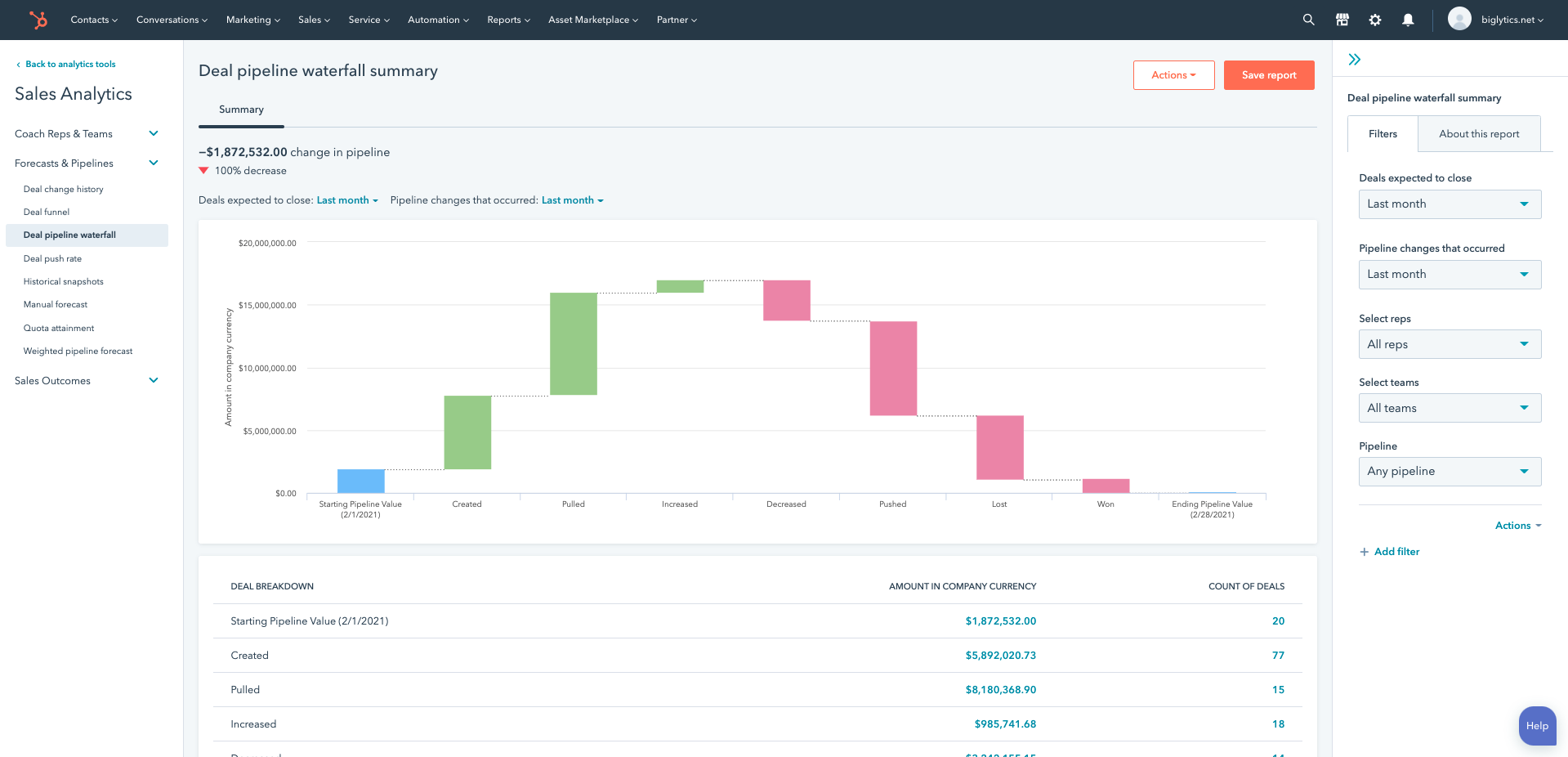
Image Source: HubSpot
I used HubSpot CRM for about six months and was impressed by its features and benefits. HubSpot CRM is a free software that helps you manage your contacts, deals, tasks, and emails. It also integrates with other HubSpot marketing, sales, service, and operations tools.
One of the features that I liked the most was the email tracking and templates. I could see when my prospects opened my emails and follow up with them at the right time. I also used the templates to create personalized and professional emails in seconds.
HubSpot CRM streamlines the sales process with its deal pipelines and stages. I could quickly move deals from one stage to another and track their progress. I could also set sales goals and monitor my performance with the dashboard and reports.
HubSpot CRM was easy to use and customize. I could add custom fields and properties to suit my needs. I also enjoyed the live chat and meeting scheduler features that enabled me to connect with my customers effortlessly.
What You’ll Like:
- Call tracking feature to monitor and prioritize sales calls
- Interactive and customizable playbooks to close deals faster
- Marketing automation with email campaigns, social media management, and analytics
- Sales forecasting and pipeline management with quotes, invoices, and payment processing
What You May Not Like:
- The platform can be slow to load and crashes at times
- The data migration and integration process can be challenging and time-consuming
Pricing:
- A free plan is available (without white labeling). Paid plans start at $18/month.
Read More: List of 8 Best HubSpot Alternatives in 2025
3. Monday Sales CRM – Best for Lead Management
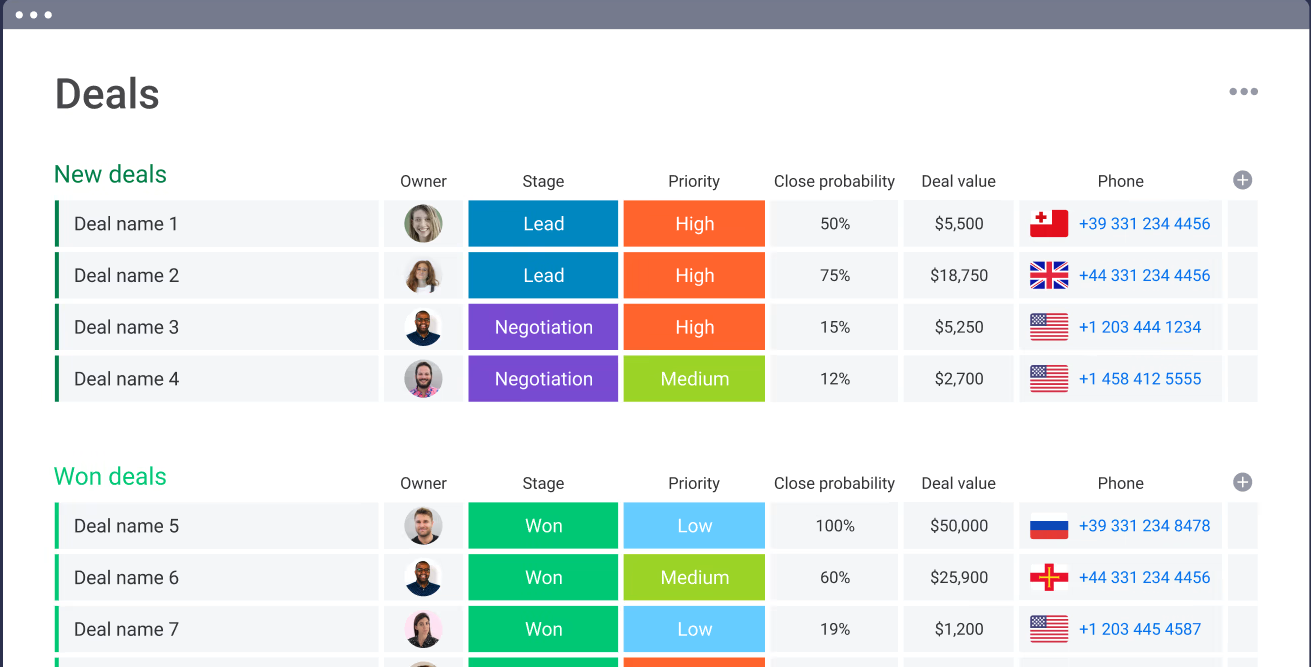
Image Source: Monday CRM
I used Monday Sales CRM to manage my sales pipeline, contact management, lead generation, and post-sales projects. I liked how I could edit my CRM to suit my sales cycle, automate tasks, integrate with other tools, and communicate with my contacts efficiently.
One of the features that I found most useful was lead management. It helped me collect leads from multiple sources, qualify them, distribute them to my sales reps, and track their online and offline interactions.
I could also see how my leads were progressing through the sales funnel and take action accordingly. Monday CRM made it easy for me to understand my customers’ pain points and requirements, and propose a solution that matched their needs. It also improved my conversion rate and customer satisfaction.
What You’ll Like:
- Dashboards and reports with sales forecasting and activity tracking
- Import and merge data from various sources and eliminate duplicates
- Lead capturing and management with web forms, scoring, and qualification
- Email sync and tracking with AI-assisted email composition and mass emails
What You May Not Like:
- The reporting and analytics tools are not very advanced
- The customer service is not very responsive and sometimes unhelpful
Pricing:
- Starts at $36/3 seats/month.
Read More: Top 7 monday.com Sales CRM Alternatives in 2025
4. Keap – Best for Lead Scoring
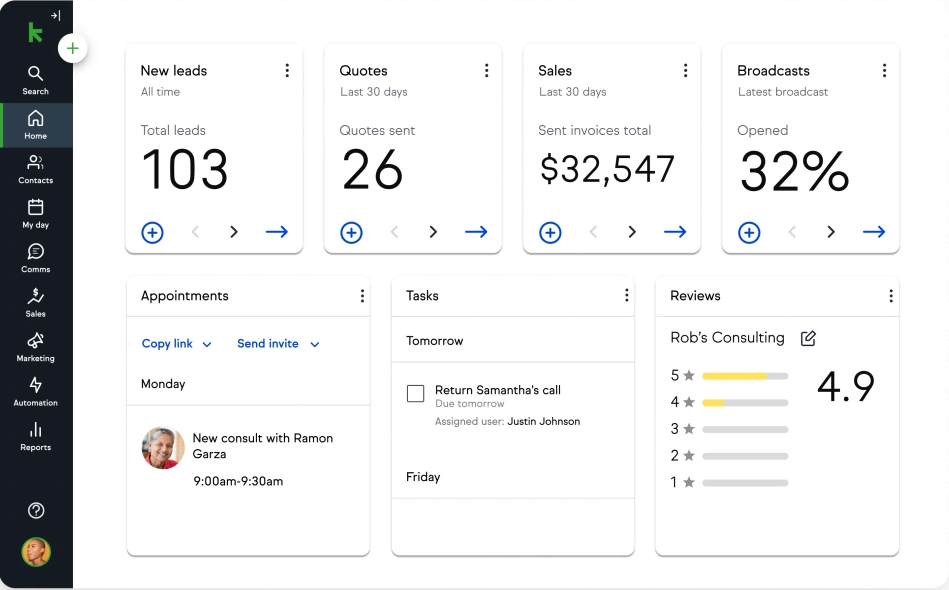
Image Source: Keap
Keap is an all-in-one CRM platform that combines sales and marketing automation, email marketing, and landing pages.
One of the features that I liked the most was the lead scoring system, which allowed me to prioritize my hottest leads and trigger automated follow-ups based on their likelihood to buy. Keap CRM also integrated seamlessly with my website and payment processor, making it easy to create and track online orders.
Keap is user-friendly and reliable, providing you with expert support and coaching whenever needed. I would recommend Keap CRM to any business that wants to save time and grow without the chaos.
What You’ll Like:
- Customer service with tickets, feedback, and internal forms
- Appointment booking and scheduling with calendar sync and reminders
- Quotes, invoices, and recurring payments with online payment processing
- Contact and account management with data enrichment and segmentation
What You May Not Like:
- The software has a steep learning curve
- The integration with third-party apps is not very smooth and sometimes causes errors
Pricing:
- Starts at $159/month.
5. Thryv – Best for Centralized Inbox
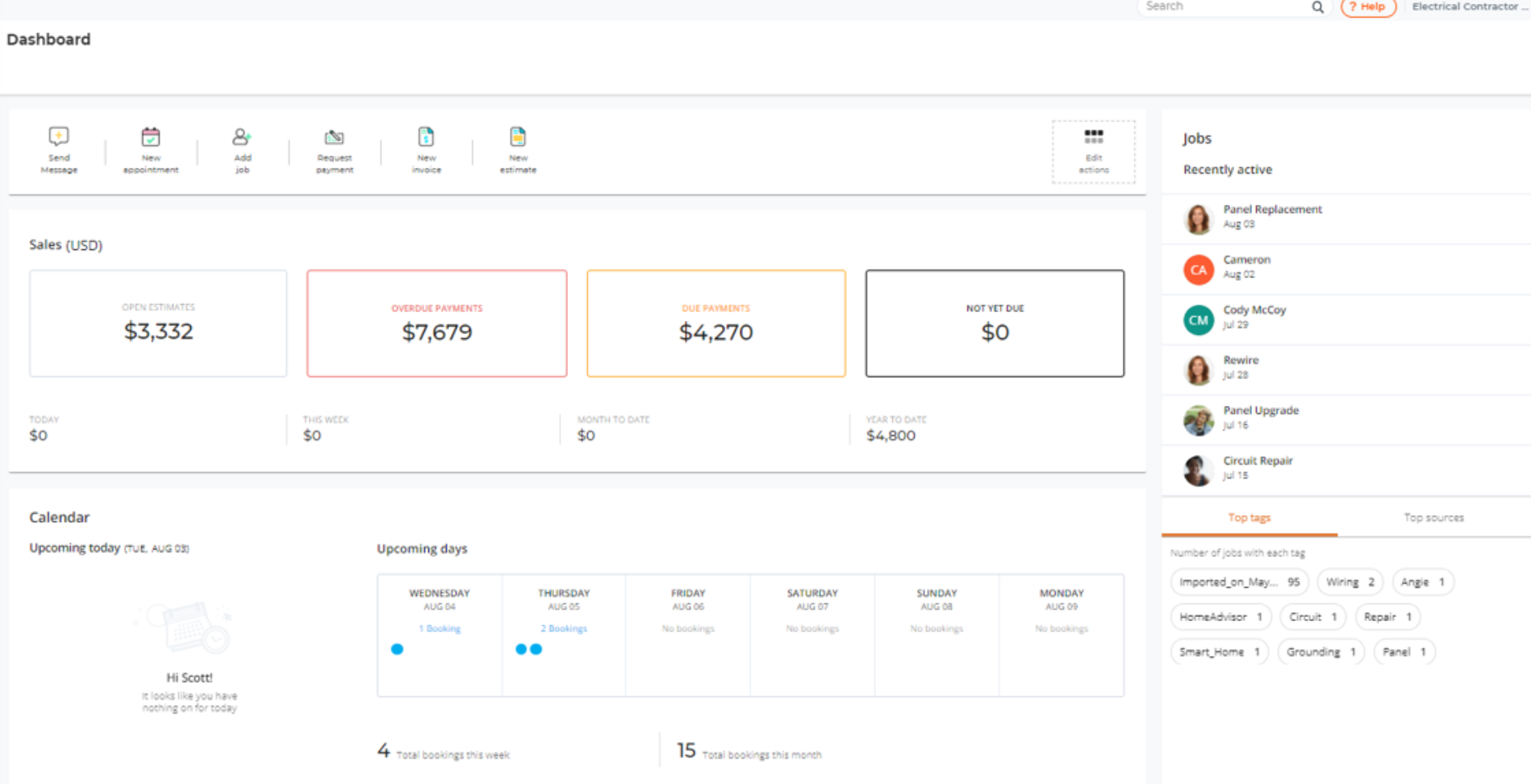
Image Source: Thryv Support Center
I used Thryv CRM during my role in the previous organization and was very impressed by how it helped me manage and grow my customer relationships.
Thryv is a comprehensive and easy-to-use CRM software that lets you organize your client data, communicate with them through various channels, schedule appointments, send estimates and invoices, and collect payments.
One of the features I liked the most was the centralized inbox, where I could see all my clients’ messages, emails, calls, and voicemails in one place. This made it easier for me to respond to their inquiries and provide a personalized service.
Thryv also integrates with popular apps, such as Google Calendar, QuickBooks, and Mailchimp, making it a highly recommended tool for businesses looking to streamline their operations and grow their customer base.
What You’ll Like:
- Saved customer history to offer personalized support
- Document storage and sharing with secure request and access
- Email and text marketing with templates, campaigns, and analytics
- Lead generation and nurturing with web popups, exit intent, and landing pages
What You May Not Like:
- The software is buggy and often crashes or freezes
- The features are limited and not very customizable
Pricing:
- A free plan is available (limited to 3 channels). Paid plans start at $20/seat/month.
6. FollowUp CRM – Best for Workload Management & Scheduling
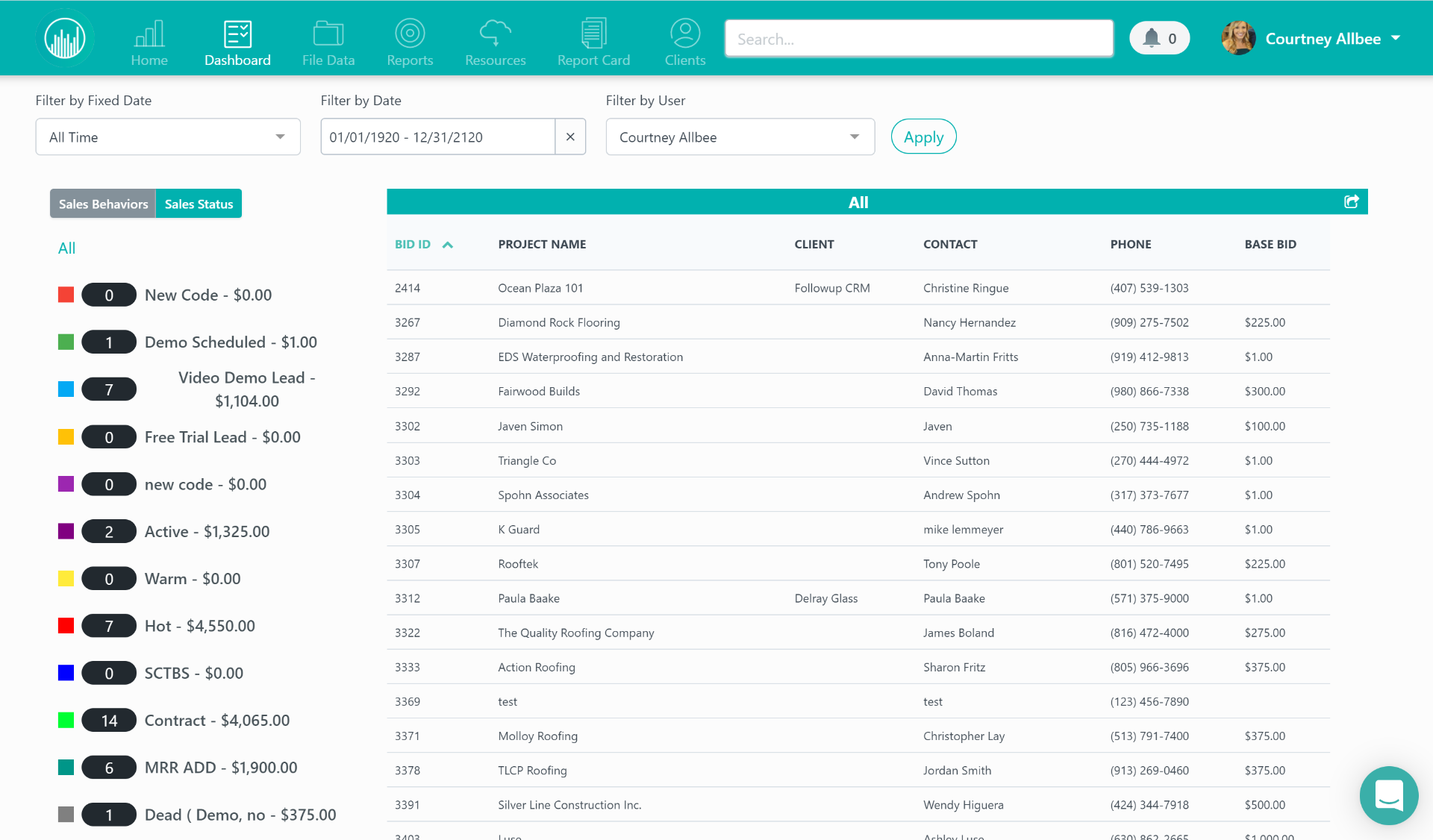
Image Source: FollowUp CRM
FollowUp CRM is a cloud-based system that streamlines sales processes, tracks leads and creates custom proposals. It also provides useful reports and dashboards to monitor team and project performance.
One of the features that I liked the most was the digital bid calendar and scheduling.
It allowed me to manage my workload, hit due dates, and keep my team in sync with one calendar. I could also see which deals had activities owing, overdue, or not assigned. This helped me prioritize my tasks and follow up with the most important leads.
FollowUp CRM is an excellent tool for contractors and builders who want to win more projects and grow their revenue. I highly recommend it to anyone in the construction industry.
What You’ll Like:
- Lead management with automatic import, scoring, and assignment
- Sales pipeline with a visual dashboard, activity tracking, and team goals
- Bid management with proposal generation, follow-up reminders, and reporting
- Project management with task tracking, collaboration, and document management
What You May Not Like:
- The file data section is hard to navigate
- The email campaigns feature is not very reliable and sometimes does not send or track emails
Pricing:
- Custom pricing.
7. Agile CRM – Best for Web Engagement
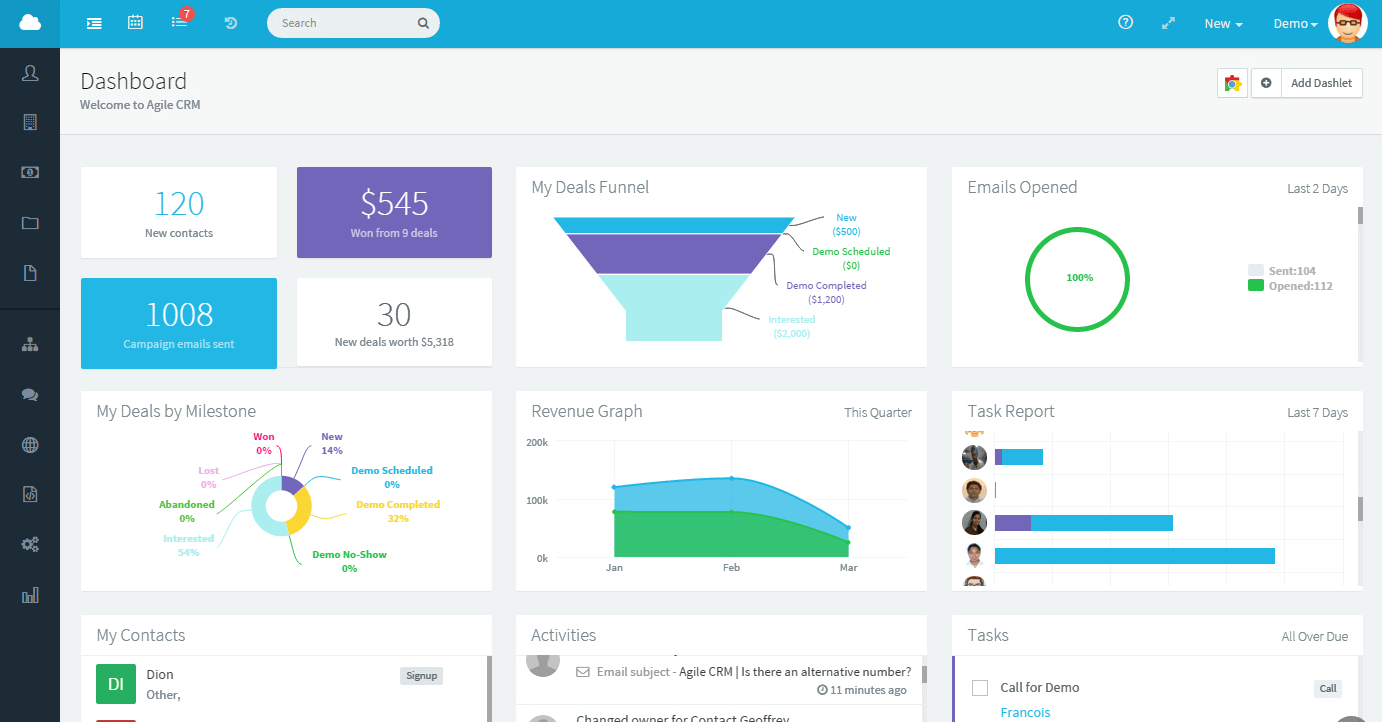
Image Source: Agile CRM
I used Agile CRM to manage my contacts, leads, and marketing campaigns. I found it to be a user-friendly and affordable CRM software offering a wide range of features and integrations.
The web engagement capabilities of the tool stood out to me, which allowed me to create pop-ups, web forms, and landing pages to capture and convert visitors to my website. I also appreciated the email marketing tool, which enabled me to create and send personalized and automated emails to my contacts.
Agile CRM also had a telephony feature that let me make and receive calls from the CRM dashboard and a helpdesk feature that helped me provide customer support and track tickets.
What You’ll Like:
- Drag-and-drop task lists to manage your projects with ease
- Contact management with lead scoring and segmentation
- Marketing automation with email campaigns and web forms
- Sales automation with lead scoring, deal management, and gamification
What You May Not Like:
- Customer support team can be unresponsive at times
- Limited integration options as compared to other Less Annoying CRM alternatives
Pricing:
- A free plan is available (limited to 10 users). Paid plans start at $14.99/month.
Read More: 9 Best Agile CRM Alternatives to Boost Your ROI
Evaluation Criteria
The evaluation of products or tools chosen for this article follows an unbiased, systematic approach that ensures a fair, insightful, and well-rounded review. This method employs six key factors:
- User Reviews / Ratings: Direct experiences from users, including ratings and feedback from reputable sites, provide a ground-level perspective. This feedback is critical in understanding overall satisfaction and potential problems.
- Essential Features & Functionality: The value of a product is ascertained by its core features and overall functionality. Through an in-depth exploration of these aspects, the practical usefulness and effectiveness of the tools are carefully evaluated.
- Ease of Use: The user-friendliness of a product or service is assessed, focusing on the design, interface, and navigation. This ensures a positive experience for users of all levels of expertise.
- Customer Support: The quality of customer support is examined, taking into account its efficiency and how well it supports users in different phases – setting up, addressing concerns, and resolving operational issues.
- Value for Money: Value for money is evaluated by comparing the quality, performance, and features. The goal is to help the reader understand whether they would be getting their money’s worth.
- Personal Experience/Expert’s Opinion: This part of the evaluation criteria draws insightful observations from the personal experience of the writer and the opinions of industry experts.
Which is the Best Less Annoying CRM in 2025?
The above list provides you with the 7 best alternatives to the Less Annoying CRM in 2025. To ease things further, here are my top 3 picks for CRM tools that maximize conversions and build long-lasting relationships.
Option A: BIGContacts
BIGContacts is one of the top choices if you are looking for CRM software with the best email and contact management features. It offers a 360-degree view of all your customers and prospects. With deal tracking, sales management, and detailed reports, BIGContacts as a contact management software can help you boost your productivity and increase conversions.
Option B: Keap
Keap can be a good option if you are looking to score leads and automate follow-ups. You can even book and schedule appointments with its calendar feature. Plus, the software offers easy segmentation to help you manage your contacts.
Option C: HubSpot
HubSpot is another great Less Annoying CRM alternative that can help you create personalized emails and even track your prospects’ engagement with those emails. It also offers customizable playbooks to help you close deals faster.
Ultimately, the best Less Annoying CRM alternative for your business depends upon your specific requirements. Evaluate your business needs and go through the above list to make an informed decision.
Learn More About Less Annoying CRM Alternatives in 2025!
Who uses Less Annoying CRM?
Less Annoying CRM caters to small businesses seeking a simple yet effective customer relationship management solution. However, the lack of advanced features is one of the reasons why businesses with more complex processes and unique needs look for a better alternative.
What features are missed out by Less Annoying CRM?
Less Annoying CRM lacks advanced features like marketing automation and in-depth analytics. Users seeking robust integrations or industry-specific functionalities may find it limiting.
How do you choose the best alternative for Less Annoying CRM?
Evaluate alternatives based on scalability, feature set, user interface, integration options, and customer support. Consider your business requirements, growth prospects, and budget to find a CRM solution that aligns seamlessly with your needs.
For more details on how to choose the right CRM solution, watch this quick video –
Read More: How to Choose a CRM for Small Businesses [Step-by-Step Guide]
What do you look for in a less annoying CRM alternative?
Look for alternatives with advanced features, customizable workflows, email marketing, deal management, and better integrations. Prioritize solutions aligning with your industry needs, ensuring a seamless transition and enhanced functionality.
FREE. All Features. FOREVER!
Try our Forever FREE account with all premium features!


